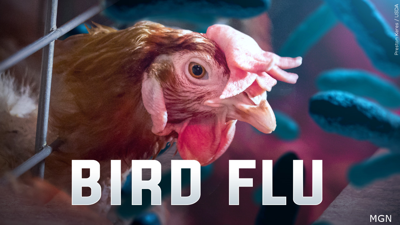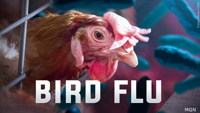CAROLINE CO., MD - The Maryland Department of Agriculture says it has preliminarily found poultry from a Caroline County farm has been infected with highly pathogenic H5N1 avian influenza, commonly called bird flu.
According to the Department of Agriculture, the affected properties have been quarantined and the birds on the farm are being euthanized to prevent spread of the disease. The Department says the affected poultry will not enter the food system.
“High Pathogenic Avian influenza or HPAI does not affect poultry meat or egg products, which remain healthy and safe to eat and handle. Poultry growers, operators, and backyard flock owners should be on high alert of the threat of HPAI,” said Maryland Department of Agriculture Secretary Kevin Atticks. “The Maryland Department of Agriculture, local health department, USDA and partner organizations are working diligently to address the situation, including quarantining and testing nearby flocks.”
Bird flu, according to the Maryland Department of Agriculture, is highly contagious and spreads between birds through nasal and eye secretions, as well as manure. Wild birds, contact with infected poultry, equipment, and even caretakers’ clothes and shoes can all spread the disease from flock to flock.
The Maryland Department of Agriculture offers the following tips if bird flu is suspected:
-Look for signs of illness. Know the warning signs of infectious bird diseases.
-Report suspected sick birds:
-To report a possible case of HPAI call the Maryland Department of Agriculture at 410-841-5810.
-Commercial chicken growers and backyard flock owners can email questions about the outbreak to
-Clean and disinfect transportation. Don’t walk through or drive trucks, tractors, or equipment in areas where waterfowl or other wildlife feces may be. If you can’t avoid this, clean your shoes, vehicle, and equipment thoroughly to prevent bringing disease agents back to your flock. This is especially important when visiting with farmers or those who hunt wild fowl such as when gathering at a local coffee shop, restaurant, or gas station.
-Remove loose feed. Don’t give wild birds, rodents, and insects a free lunch. Remove spilled or uneaten feed right away, and make sure feed storage units are secure and free of holes. Wild birds can carry HPAI.
-Keep visitors to a minimum. Only allow those people who take care of your poultry to come in contact with your birds, including family and friends. Make sure everyone who has contact with your flock follows biosecurity principles.
-Wash your hands before and after coming in contact with live poultry. Wash with soap and water. If using a hand sanitizer, first remove manure, feathers, and other materials from your hands because disinfectants will not penetrate organic matter or caked-on dirt.
-Provide disposable boot covers (preferred) and/or disinfectant footbaths for anyone having contact with your flock. If using a footbath, be sure to remove all droppings, mud or debris from boots and shoes using a long-handled scrub brush BEFORE stepping into the disinfectant footbath, and always keep it clean.
-Change clothes before entering poultry areas and before exiting the property.
Visitors should wear protective outer garments or disposable coveralls, boots, and headgear when handling birds, and shower and/or change clothes when leaving the facility.
-Clean and disinfect tools or equipment before moving them to a new poultry facility. Before allowing vehicles, trucks, tractors, or tools and equipment—including egg flats and cases that have come in contact with birds or their droppings—to exit the property, make sure they are cleaned and disinfected to prevent contaminated equipment from transporting disease. Do not move or reuse items that cannot be cleaned and disinfected—such as cardboard egg flats.
The U.S. Department of Agriculture National Veterinary Services Laboratory is working to confirm the detection in Caroline County, with final results expected in the coming days. More information on avian influenza can be found here.



